
|

|

|

|

|

$220 SAVE $130 = 37.0% Western Digital 16.0TB Western Digital Ultrastar DC HC550 3.5-in… in Storage: Hard Drives
|

|

|

|

|
OWC Accelsior 8M2 PCIe SSD
Related: 2019 Mac Pro, bandwidth, GPU, Mac Pro, Macs, memory, memory bandwidth, Other World Computing, OWC Accelsior 4M2 PCIe SSD, OWC Accelsior 8M2 PCIe SSD, PCIe SSD, SSD, video tech

Evaluted in the $9399 Apple 2019 Mac Pro with 384GB OWC memory.
The support of OWC / MacSales.com and B&H Photo is essential for making these reviews possible. Please order through our links via these companies and/or subscribe to diglloyd publications.
Mac wish list • Storage wish list • SSD wish list • Ports wish list
Don’t overspend—not which Mac to get or how to configure it? Consult with MPG Lloyd.
This page evaluate the 32TB OWC Accelsior 8M2 PCIe SSD. Capacities from 2TB to 64TB are available.
The Accelsior 8M2 arrives roughly two years after the OWC Accelsior 4M2, which set a high standard for SSD performance double that of any SSD offered by Apple. MPG (Lloyd) has been using the Accelsior 4M2 for nearly those two years, and it has performed flawlessly.
Applications
There are two reasons to consider the Accelsior 8M2. First, the awesome capacity of up to 64TB internal SSD in a single PCIe card is a problem solver (two cards would be a stunning 128TB!). Second, the I/O speed is a strong underpinning for systems having the maximum CPU and GPU grunt, lest those CPU and GPU cores sit idle for want of data to crunch.
Ordinary everyday applications cannot make use of the 6GB/sec of the OWC Accelsior 4M2, let alone the 12GB/sec of the OWC Accelsior 8M2. That includes popular applications like Photoshop, which cannot read files much faster than 600MB/sec or so (spiking to 1GB/sec)—a fraction of the potential speed of the SSD.
However, data processing applications and specialized 8K video processing can at times demand I/O performance in excess of the 6GB/sec that the Accelsior 4M2 provides. That’s where the Accelsior 8M2 comes in. Such applications involve maxed-out systems in the $25K range on up. Eliminating disk I/O as a constraint in such systems can make or break the efficiency of the entire 'rig'. Eliminating disk I/O as a performance constraint is in effect a 'multiplier' of the capability of the entire system.
8 SSD blades, one volume
The OWC Accelsior 8M2 PCIe SSD has 8 slots for M.2 NVMe SSD modules. It is shipped with SoftRAID, which combines those 8 modules into a single RAID-0 stripe volume . Various other configurations are possible, but one large striped volume makes the most sense for a product like this.
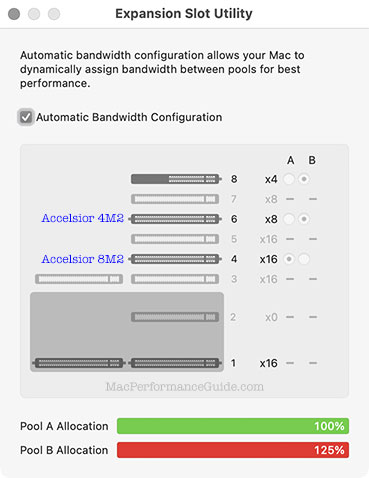
Physical, bandwidth
The OWC Accelsior 8M2 is a full length 16-lane PCIe card. The optimal PCIe lane onfiguration will vary depending on how many and what type of PCIe cards are installed, as well as how they operate simultaneously or not.
The 2019 Mac Pro with PCIe 3.0 lacks the PCIe bandwidth for full performance for all cards with all slots full. Ading two more cards (8X and 16X) to what is shown here would oversubscribe the bandwidth by 100%, throttling maximum theoretical performance considerably. In practice however, not all cards need bandwidth at the same time. Here, the OWC Accelsior 8M2 has full bandwidth allocation available in Pool A. The OWC Accelsior 4M2 is in Pool B and might have to share bandwidth with the GPU for brief periods.
Having the OWC Accelsior 8M2 share its allocated bandwidth in an oversubscribed pool is not likely to have any material impact on performance, because other factors (software, operating system) often constrain speeds that are needed (or usable) to below the peak performance. For example, IntegrityChecker Java on a 28-core Mac Pro can hash at nearly 13GB/second. Two such instances would require 26GB/sec... but the CPUs are already fully utilized at around 12 GB/sec.
Acoustics
Unlike the fanless OWC Accelsior 4M2, the OWC Accelsior 8M2 utilizes a small internal fan. It is quiet, but not inaudible, with a slightly different pitch than that of the Mac Pro, so it can be heard in a quiet room at a distance of 2-3 feet.
Results: speed across entire capacity, large I/O sizes
Tested using the fill-volume command of diglloydTools DiskTester.
This performance nearly doubles the speed of the OWC Accelsior 4M2, which itself delivers twice the speed of the SSDs in all Macs prior to late 2021*. Basically, twice the blades and twice the PCIe lanes.
There is some deviation as seen in the graph, but whether this is the card itself or some deviation in system responsiveness is hard to say. But at 12GB/sec system perturbations could affect the performance. At any rate, the deviations would not impact on any conceivable application.
* The 2021 Apple MacBook Pro M1 Max designs utilize SSDs hitting 6+ GB/sec speeds, similar to the OWC Accelsior 4M2 performance. Prior Macs all maxed-out at about 3.2 GB/sec.
Write 11777 MB/sec
Read: 11692 MB/sec
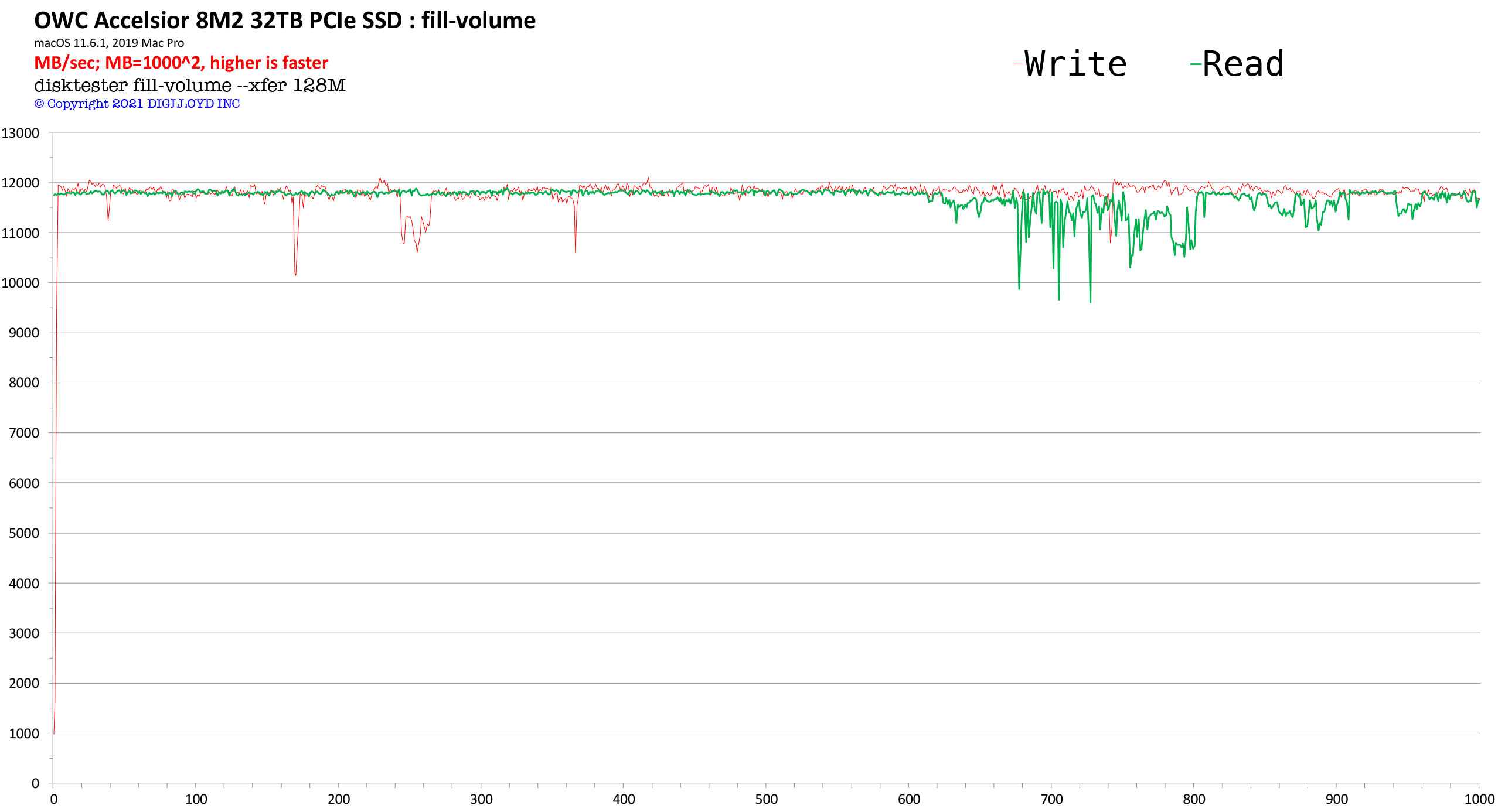
Results: speed vs I/O size
Tested using the run-sequential-suite command of diglloydTools DiskTester.
Crazy fast! Speed with only 256 KiB transfers already approaches maximum speed of most Apple internal SSDs* and it only gets faster from there!
Applications will not realize the full speed unless very large I/O buffers are used. Even a 2/4/8MB buffer realizes only about half the maximum speed. Only specialized software written to make large I/O requests (at least 128MB per transfer) allow the Accelsior 8M2 to operate at or near full speed.
* The 2021 Apple MacBook Pro M1 Max designs utilize SSDs hitting 6+ GB/sec speeds, similar to the OWC Accelsior 4M2 performance. Prior Macs all maxed-out at about 3.2 GB/sec.
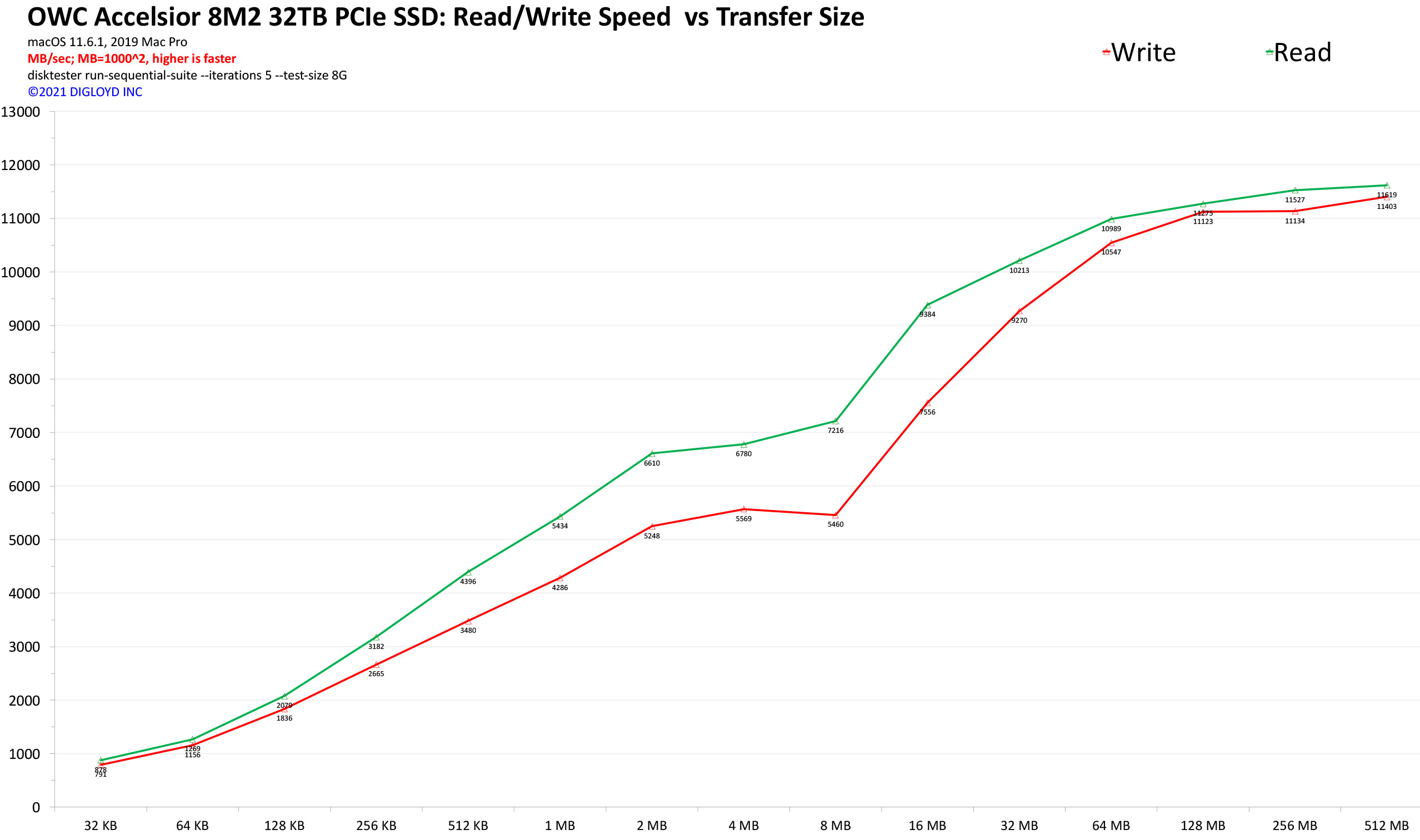
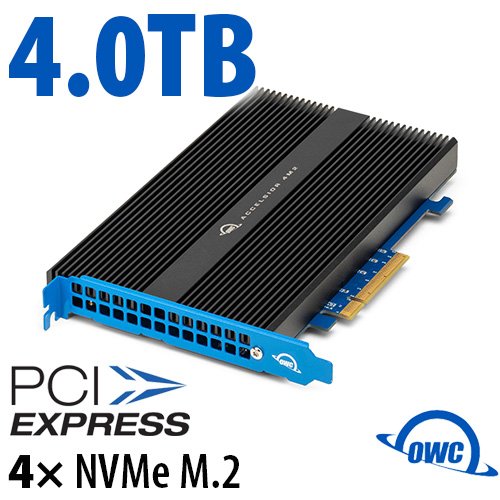
$850 SAVE $8150 = 90.0% OWC 4.0TB OWC Accelsior 4M2 PCIe 3.0 NVMe M.2 SSD Storage Soluti… in Storage: PCI
|
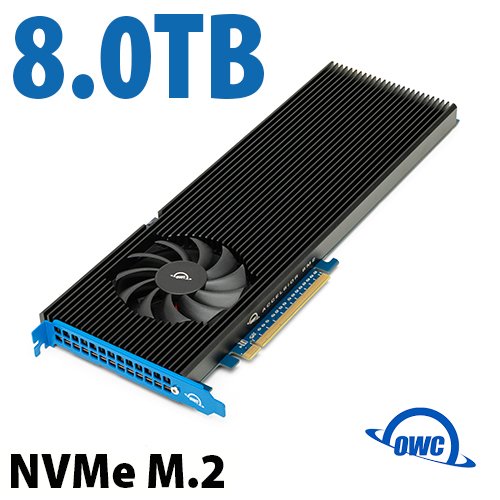
$2200 SAVE $6799 = 75.0% OWC 8.0TB OWC Accelsior 8M2 PCIe 4.0 NVMe M.2 SSD Storage Soluti… in Storage: PCI
|
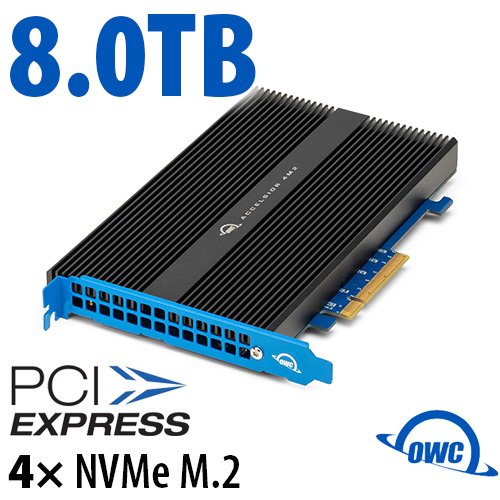
$1400 SAVE $7600 = 84.0% OWC 8.0TB OWC Accelsior 4M2 PCIe 3.0 NVMe M.2 SSD Storage Soluti… in Storage: PCI
|
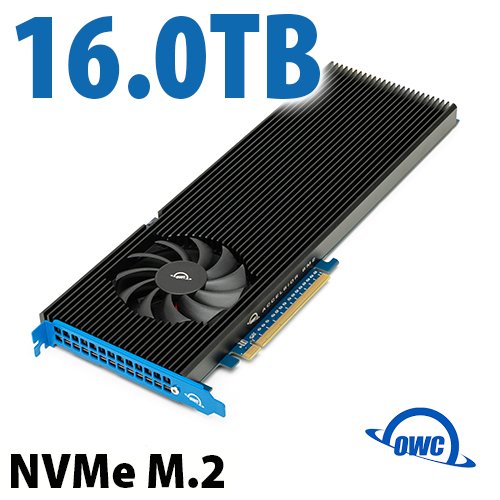
$3500 SAVE $5499 = 61.0% OWC 16.0TB OWC Accelsior 8M2 PCIe 4.0 NVMe M.2 SSD Storage Solut… in Storage: PCI
|
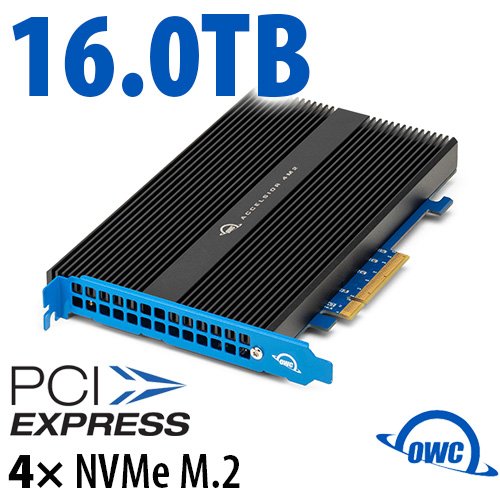
$2300 SAVE $6700 = 74.0% OWC 16.0TB OWC Accelsior 4M2 PCIe 3.0 NVMe M.2 SSD Storage Solut… in Storage: PCI
|
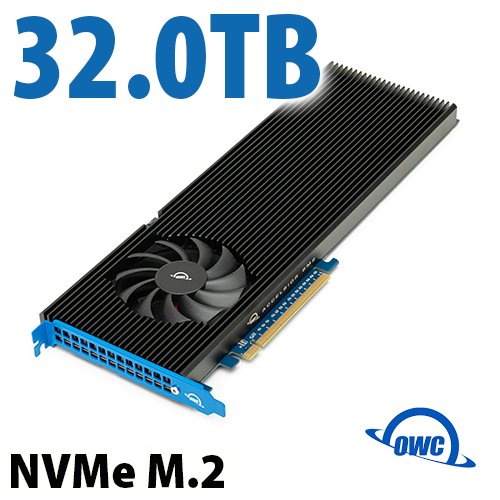
$5700 SAVE $3299 = 36.0% OWC 32.0TB OWC Accelsior 8M2 PCIe 4.0 NVMe M.2 SSD Storage Solut… in Storage: PCI
|
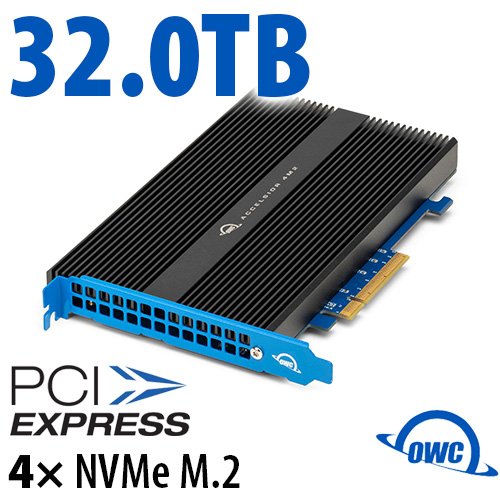
$5580 SAVE $3420 = 38.0% OWC 32.0TB OWC Accelsior 4M2 PCIe 3.0 NVMe M.2 SSD Storage Solut… in Storage: PCI
|

|

Seagate 22TB IronWolf Pro 7200 rpm SATA III 3.5" Internal NAS HDD (CMR)
SAVE $100


 diglloydTools™
diglloydTools™

